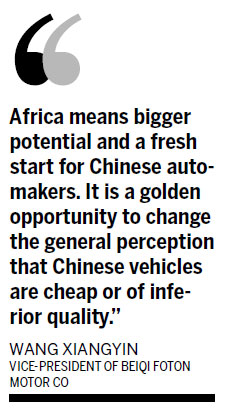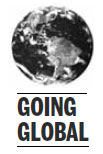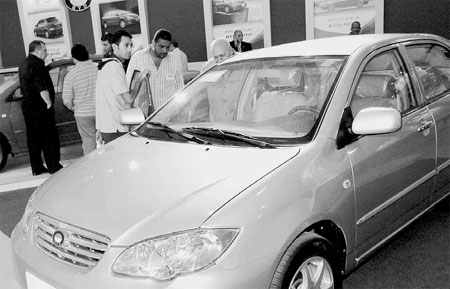Automakers map out sales plans in Africa
Updated: 2013-05-14 13:47
By Wang Chao (China Daily)
|
||||||||
|
A BYD sedan at an auto show in Cairo, Egypt. This year, the company expects to deliver 8,000 to 10,000 vehicles in Egypt. Lin Yiguang / Xinhua |

Companies hope to offset tough conditions elsewhere by making inroads in the growing market, reports Wang Chao.
Like most people in Africa, Cisse Ouattara, an automobile dealer, had never heard of Beiqi Foton Motor Co, or seen the trucks that the Chinese company is best known for, until a few years ago.
But nowadays, it would not be surprising to see the Cote d'Ivoire dealer interspersing his sales pitches with interesting tidbits about China and the Beijing-based truck maker.
Like Foton, several other Chinese automobile companies are now pinning their hopes on Africa to offset slowing conditions at home and elsewhere in the world.
Africa is still virgin territory for most Chinese automakers, and these companies are coming up with unique marketing strategies to make inroads into the price-conscious, but growing African auto market.
Wang Xiangyin, vice-president of Foton, said that Africa offers opportunities as well as challenges.
"Africa means bigger potential and a fresh start for Chinese automakers. It is a golden opportunity to change the general perception that Chinese vehicles are cheap or of inferior quality," he said.
There is no doubt that Foton has already enjoyed considerable success in Africa. Backed by its team of hard-talking sales professionals like Ouattara, Foton has become the leading Chinese automobile exporter to Africa. Last year, the company shipped over 20,000 vehicles to the continent, including vans, pick-ups and light trucks.
In the next stage of its operations, Foton will start assembling vehicles locally in Africa by using the completely knocked-down kits imported from China. Wang said that this strategy will help the company boost sales as it provides a way to avoid the high tariffs on imported cars in nations such as South Africa, Algeria and Egypt.
Foton has divided its global market into three categories: mature markets such as Europe, the United States, Japan and South Korea; young markets such as Africa; and everything in between as emerging markets, like Russia and Brazil.
"Africa is also a unique advantage for us as most of the African countries enjoy good relations with China and the local people trust Chinese partners. Consequently we face fewer trade barriers in Africa."

Foton, however, does not intend to concentrate only on some markets in Africa. "We will focus on the whole continent, starting with the relatively mature markets such as Egypt and South Africa," Wang said.
Wang said that companies also need to consider factors such as climate and the environment when exporting vehicles. "The vehicles have to be tailored to adapt to extreme weather conditions," he said.
Zhang Zhiliang, head of the Foton Automotive Engineering Research Institute, said the company had to make adjustments to ensure that its vehicles do not suffer from problems such as overheating engines and tires in Africa.
Other changes, including a larger venting area for the engine, high-endurance rubber spare parts and high-powered air conditioners, are all special tweaks that the company incorporates in its African models, Zhang said.
Unlike Foton, which focuses on building customized vehicles for the African market, BYD Auto Co is banking on efficient logistics to drive sales in Africa.
Isbrand Ho, general manager of BYD's auto export trade division, said the company will soon set up one or two logistics centers in Africa, to facilitate smoother delivery of passenger cars, electric vehicles and spare parts.
"Having such a set-up on the ground in Africa ensures that our after-sales team can quickly procure the required spare parts in the event of vehicle breakdowns," Ho said.
The company has been present in Africa for more than seven years and has assembly units in Syria, Egypt, Iraq and Russia.
Thanks to a strong local partner in Egypt, BYD recently secured a large order to provide taxis in Cairo. The company is also bidding for government car orders in Egypt. This year, it expects to deliver 8,000 to 10,000 vehicles in Egypt. Though the limited capacity of its local plant only allows 20 cars to be produced every week, it is pushing its local partner to expand the capacity to 200 units a week by the end of August, say company officials.
The reciprocal arrangements that Egypt enjoys with other African countries, such as Tunisia and Morocco, also helps BYD to sell its vehicles in these markets without attracting additional duties.
"The African market is basically a low-price and low-demand market," Ho said.
"We sell them cars with fewer features. In China, for instance, most cars have power windows, but cars in Africa still have hand-rolled windows. These features are taken out in Africa to reduce the costs."
Currently, BYD only sells its sedan model F3 in Africa. Plans are afoot to introduce sports utility vehicles soon as the company feels that there is enough demand to deal with the tough road conditions in many parts of the continent.
Dong Yang, vice-chairman of the China Association of Automobile Manufacturers, said that though Chinese companies don't have recognizable brand names, customers in most of the destination markets are becoming more price-sensitive in recent years due to the financial crisis. All these aspects offer rosy prospects for Chinese automakers, he said.
In 2007, when BYD started exporting vehicles, there was hardly any difference between its domestic and export models. "The only difference in those days was the country name on the brochure. But now we know that this is just not possible and that we have to design vehicles specifically for individual markets," Ho said.
Changing customer preferences are another reason why companies have chosen to tailor Africa-specific vehicles. While Russian customers love big, bulky SUVs and require seats that can withstand extreme cold, vehicles for the Middle East market tend to be models with big engines, leather seats and a sharp finish.
"For the emerging markets, we focus more on the value-for-money models, while in the mature markets, we focus on environmental friendly models," Ho said.
BYD electric vehicles are already sold in mature markets such as the United Kingdom, Israel and Poland. Ho hopes that electric vehicle exports will increase substantially in the next five years, with Africa having a major say in overall revenues.
(China Daily 05/14/2013 page16)

 Michelle lays roses at site along Berlin Wall
Michelle lays roses at site along Berlin Wall
 Historic space lecture in Tiangong-1 commences
Historic space lecture in Tiangong-1 commences
 'Sopranos' Star James Gandolfini dead at 51
'Sopranos' Star James Gandolfini dead at 51
 UN: Number of refugees hits 18-year high
UN: Number of refugees hits 18-year high
 Slide: Jet exercises from aircraft carrier
Slide: Jet exercises from aircraft carrier
 Talks establish fishery hotline
Talks establish fishery hotline
 Foreign buyers eye Chinese drones
Foreign buyers eye Chinese drones
 UN chief hails China's peacekeepers
UN chief hails China's peacekeepers
Most Viewed
Editor's Picks

|

|

|

|

|

|
Today's Top News
Shenzhou X astronaut gives lecture today
US told to reassess duties on Chinese paper
Chinese seek greater share of satellite market
Russia rejects Obama's nuke cut proposal
US immigration bill sees Senate breakthrough
Brazilian cities revoke fare hikes
Moody's warns on China's local govt debt
Air quality in major cities drops in May
US Weekly

|

|








